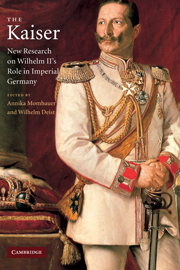Book contents
- Frontmatter
- Contents
- Notes on contributors
- Acknowledgements
- List of abbreviations
- Introduction
- Reflections on John Röhl: a Laudatio
- 1 Wilhelm II and ‘his’ navy, 1888–1918
- 2 Hollow-sounding jubilees: forms and effects of public self-display in Wilhelmine Germany
- 3 The Kaiser's elite? Wilhelm II and the Berlin administration, 1890–1914
- 4 Wilhelm, Waldersee, and the Boxer Rebellion
- 5 Dreams of a German Europe: Wilhelm II and the Treaty of Björkö of 1905
- 6 The uses of ‘friendship’. The ‘personal regime’ of Wilhelm II and Theodore Roosevelt, 1901–1909
- 7 Military diplomacy in a military monarchy? Wilhelm II's relations with the British service attachés in Berlin, 1903–1914
- 8 Wilhelm II as supreme warlord in the First World War
- 9 Germany's ‘last card’. Wilhelm II and the decision in favour of unrestricted submarine warfare in January 1917
- 10 Military culture, Wilhelm II, and the end of the monarchy in the First World War
- 11 Rathenau, Wilhelm II, and the perception of Wilhelminismus
- 12 Structure and agency in Wilhelmine Germany: the history of the German Empire – past, present, and future
- Index
3 - The Kaiser's elite? Wilhelm II and the Berlin administration, 1890–1914
Published online by Cambridge University Press: 24 July 2009
- Frontmatter
- Contents
- Notes on contributors
- Acknowledgements
- List of abbreviations
- Introduction
- Reflections on John Röhl: a Laudatio
- 1 Wilhelm II and ‘his’ navy, 1888–1918
- 2 Hollow-sounding jubilees: forms and effects of public self-display in Wilhelmine Germany
- 3 The Kaiser's elite? Wilhelm II and the Berlin administration, 1890–1914
- 4 Wilhelm, Waldersee, and the Boxer Rebellion
- 5 Dreams of a German Europe: Wilhelm II and the Treaty of Björkö of 1905
- 6 The uses of ‘friendship’. The ‘personal regime’ of Wilhelm II and Theodore Roosevelt, 1901–1909
- 7 Military diplomacy in a military monarchy? Wilhelm II's relations with the British service attachés in Berlin, 1903–1914
- 8 Wilhelm II as supreme warlord in the First World War
- 9 Germany's ‘last card’. Wilhelm II and the decision in favour of unrestricted submarine warfare in January 1917
- 10 Military culture, Wilhelm II, and the end of the monarchy in the First World War
- 11 Rathenau, Wilhelm II, and the perception of Wilhelminismus
- 12 Structure and agency in Wilhelmine Germany: the history of the German Empire – past, present, and future
- Index
Summary
At the beginning of his reign Kaiser Wilhelm II did not have a great deal of confidence in the men who occupied the key positions in the Prussian government and imperial administration in Berlin. In January 1890, less than two months before his unceremonious dismissal of Imperial Germany's first Chancellor, he told the Grand Duke of Baden: ‘These ministers are not my ministers, of course, they are the ministers of Prince Bismarck.’ Even so, he must have been gratified by the stance taken by the Prussian ministers and imperial state secretaries in the Chancellor crisis of March 1890 for only one of them, the Chancellor's son and Foreign Secretary, Herbert von Bismarck, chose to resign in a display of solidarity with his father. Three others – the Minister of War, Julius Verdy du Vernois, the Minister of Agriculture, Robert Lucius von Ballhausen, and the Minister of Finance, Adolf von Scholz – were to leave office later in the year for reasons unconnected with Bismarck's dismissal. The other Prussian ministers – Gustav von Gossler, Ernst Ludwig Herrfurth, Hermann von Schelling, Albert Maybach, and Hans Hermann von Berlepsch, who respectively headed the Ministries of Education, the Interior, Justice, Public Works, and Trade – remained at their posts for the time being under the new Chancellor, Leo von Caprivi. In the imperial administration, too, the transition to the ‘New Course’ was smoothly effected.
- Type
- Chapter
- Information
- The KaiserNew Research on Wilhelm II's Role in Imperial Germany, pp. 63 - 90Publisher: Cambridge University PressPrint publication year: 2003



